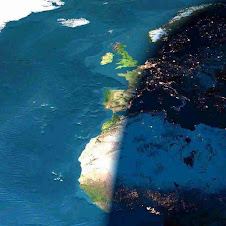The winner has got to be Danny, Adam, Lil, or Allison. Allison is only 16 but when she gets on the stage, I heave a sigh of relief because I know that she can belt it out and sounds like she knows what she's doing. This is second time only in my life that I have followed the most popular show in the world--is that really true or a just marketing ploy?--for an entire season.
The show is all glitz and hype and about talent coming true. If making your dream real were so easy as this....Well, 'easy' is not the word that these contestants would use, I suspect. Must be kind grueling to wait and watch, sing a song, wait, be told you are going home or even staying. Practice, sing, sing, practice, TV, makeup, glam squad, more practice, nerves, in your face brights lights. (God, my idea of a nightmare!)
But this is precisely why the show holds me fascinated in the palm of its super-slick and glossy hand. Me and a good number of people in the rest of the country.
It's the process and the presence of rules. I like rules, don't you know. There's a clear and defined goal. Performances are judged, and then package of the person is presented to John and Jane Doe of USA Public, and John and Jane Doe vote. By the millions.
How democratic.
I have not ever voted for an idol contestant, not even the season when Carrie Underwood won, but that was because I had an ancient cell phone. The cell phone was a Nokia with an antenna and built like a brick but I couldn't text anything, and now, well, I have not yet decided why I'm not voting now. Is my not voting a-lack-of-willingness-to-admit-that-I-am-watching-this-show? Or is my not voting because the whole business is silly, and my 'participation' simply a quick, painless, and harmless way of forgetting about troubles of the day?
And then my question becomes: how is someone's dream, their cherished hope, silly?
No dream is silly to the Dreamer.
My dream was
not a graduate degree. Disappointed with the rejection, but no crushed. This is not as odd as it sounds, especially for those of you who know me.
What I really want, more than anything, is to publish that young adult science fiction fantasy trilogy that I have been working on...oh, lo, these almost 10 years. Average rough draft manuscript length is about 120,000 words. Book I is under revision. Book II is a MONSTER. With drooly gaping teeth and horrible grammar like a mouthful of cavities. No one has ever read any snippet of Book II, not even my mother who loves me
a lot. Book III is 50 pages away from done. (It feels like I should be almost reaching the ocean: I can smell and feel the ocean, aka the ending, but it's not yet in view and I have no idea what it will actually be like.)
This is my dream. Is it silly? Not at all. It's my favorite bedtime story of all time, better than Gerald Durrell's book on his childhood in Corfu, Greece. Far more compelling, although perhaps less eloquent than Madeleine L'Engle's works, and even more tried and true than Anne McCaffery's Dragonsinger series. The "When I get published" bedtime story is so good that it keeps me up at night, past midnight, when I know I'll suffer the next day. I have been telling myself this story since I was about 13 years old.
I'm not longer 13 and my dream is much closer to becoming reality than it used to be. I have revisions of Zomas well underway. Then there are the 3 very rough manuscripts absolutely unrelated to Zomas, all of which have the germ of possibility in them--like pluripotent cell line, they have the charming magic of still being unformulated and therefore capable of turning into anything. Two are about Croatians, that's my background and so runs deep, and one, well that one is a story that I need permission from a very old friend of mine to even talk about.
Then there's the new critique group that my writer friend and eerily-like-minded pal Mandy and I started. We hope it will be good. There's the Society of Children's Books Writer's and Illustrators (SCBWI). Try saying that 10 times fast. I've been a member for 3 years. The point of all these paragraphs is to illustrate my way around the complexity of a dream, and show the work work work that goes in to making it true.
I would bet money that my idol favorites have similiar tales of years of practice and work. Late night daydreams that kept them up, like hitting repeat of the sound track, or hell, just playing something over and over and over.
Dreams are never silly because of the work involved. And so I watch American Idol, and wonder: what is the real story of these singers? These immensely brave souls who are willing to get out there in front of John and Jane Doe of USA Public, only to be rejected by all the voters or non-voters like me, all of us Dreamers who tune on Tuesday or Wednesday or whenever they sing their last song? What kind of bedtime stories do they tell themselves, or what songs do they sing in the dark, when no one is listening?
I end with the last paragraph of one of my favorite poems:
The real writer is one
who really writes. Talent
is an invention like phlogiston
after the fact of fire.
Work is its own cure. You have to
like it better than being loved.
Post Script
If you recognize the author (not me, but I didn't write down who wrote this alas), please let me know. Thanks.














